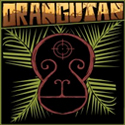It’s not easy to find bee colonies in Bali that are actively being used for honey production even though beekeeping is a great way to bring positive impacts for the unique ecology of this island.
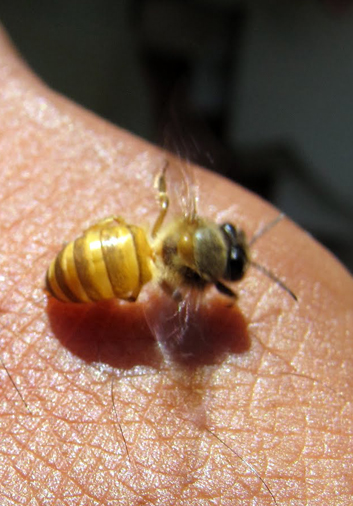 Founder of Yayasan Tri Hita Karana (THK) Bali, Chakra Widia, promotes how beekeeping benefits the growth of vegetables, fruits and flowers. “Bees are one of nature’s most productive pollinators and can have a dramatic beneficial effect on yields in terms of seed yield and fruit yield in many crops,” says Chakra. “And best of all you get the honey. In fact, we’d say beekeeping is a honey of a hobby.”
Founder of Yayasan Tri Hita Karana (THK) Bali, Chakra Widia, promotes how beekeeping benefits the growth of vegetables, fruits and flowers. “Bees are one of nature’s most productive pollinators and can have a dramatic beneficial effect on yields in terms of seed yield and fruit yield in many crops,” says Chakra. “And best of all you get the honey. In fact, we’d say beekeeping is a honey of a hobby.”
Using Permaculture principles, THK Foundation educates, advocates and acts to bring about more environmentally and economically sustainable practices in all fields of human activity in Bali. On March 24-25 THK will hold a beekeeping workshop at their learning center in Pengosekan, Ubud. The theme of the workshop is “BEE the change” a playful spin on the famous Gandhi quote “Be the change you want to see in the world.”
According to Chakra, beekeeping is not something you just do on a whim. “It’s a responsibility and to undertake it, you need to have a basic understanding of bees, especially the wild bees we have here in Bali,” says Chakra.
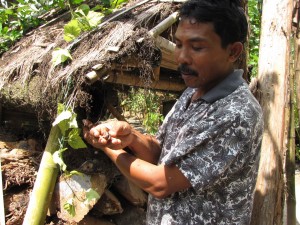 Workshop participants will be learning from I Gede Panca, an expert honey beekeeper in Bali. With a lifelong involvement in beekeeping, Panca is not only an expert but also a passionate advocate for the island’s wild bee population.
Workshop participants will be learning from I Gede Panca, an expert honey beekeeper in Bali. With a lifelong involvement in beekeeping, Panca is not only an expert but also a passionate advocate for the island’s wild bee population.
Panca was the inaugural winner of Indonesia’s best beekeeping title in 1998. Panca has founded three local beekeeping organizations in Payangan, Tegallalang and Petak and they meet together twice a year.
The bilingual weekend workshop is designed for novice beekeepers who want to learn beekeeping and start a colony of their own. During the workshop, participants will learn about Bali’s native bees, as well as an aggressive new kid on the block that may ultimately upset the island’s bee biodiversity.
Participants will also learn about flowers and their influence on the taste of honey, with plenty of honey tasting to sweeten the session.
Each participant will construct a modest bee box best suited to house the island’s native bees. This bee box may be taken home afterward or donated to the THK Permaculture demonstrations farm.
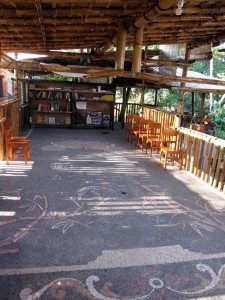 Much of the workshop will take place at the THK learning center – constructed from bamboo in a light and airy design. There will also be a field trip to explore a bee colony that has inhabited a neighbor’s family temple, quite a common occurrence in Bali.
Much of the workshop will take place at the THK learning center – constructed from bamboo in a light and airy design. There will also be a field trip to explore a bee colony that has inhabited a neighbor’s family temple, quite a common occurrence in Bali.
Panca will show participants how to locate the queen in the colony and move the bees from the temple into a bee box.
Participants will also learn where to place bee boxes to attract bees, moving the bees to new food sources, and methods of identifying and dealing with predators. Panca will demonstrate how to harvest honey and how much to take from a colony so that enough food remains to sustain the bees and their larvae. He will also demonstrate his beesting “treatment” to reduce the risk of blood clots.
Assisting Panca during the workshop will be THK’s medicinal herb expert, Tri Suda Pala. Tri will lead a workshop session on the medicinal qualities of honey and the importance of pollination for medicinal herbs. Those attending can order bees, honey, or extra boxes from Panca, as well as medicinal herbs from Tri.
Chakra hopes that the workshop will be a springboard for helping to expand the knowledge base of bees and beekeeping in Bali and provide a network of sentinels to warn of any changes in the island’s bee population. “We hope we can foster the establishment of an umbrella organization of Bali beekeepers to work in cooperation with local beekeepers to ensure that our island’s native bee colonies continue to flourish,” he says.
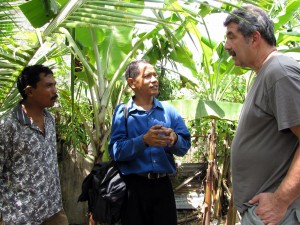 Visiting beekeeper Steve Black from the Isle of Man, between England and Ireland, says ongoing support for novice beekeepers is vital and endorsed the formation of a group that meets regularly to continue the learning process.
Visiting beekeeper Steve Black from the Isle of Man, between England and Ireland, says ongoing support for novice beekeepers is vital and endorsed the formation of a group that meets regularly to continue the learning process.
“Nobody can hope to learn all that there is to know about beekeeping in a weekend workshop,” he says. “When situations arise with your bees, it’s important to be able to network with other more experienced beekeepers for advice.”
Places are limited and bookings close on March 19th. Booking inquiries can be made by email to: thkbalicommunications@gmail.com or by phone: 087 861 463 406 or 081 338 794 571 (Chakra).
Participants should bring their own lunch or, for Rp. 15,000 each day they can have lunch provided. They should also bring a hat, sunscreen and, if they are allergic to beestings, it goes without saying that they should bring an EpiPen.





